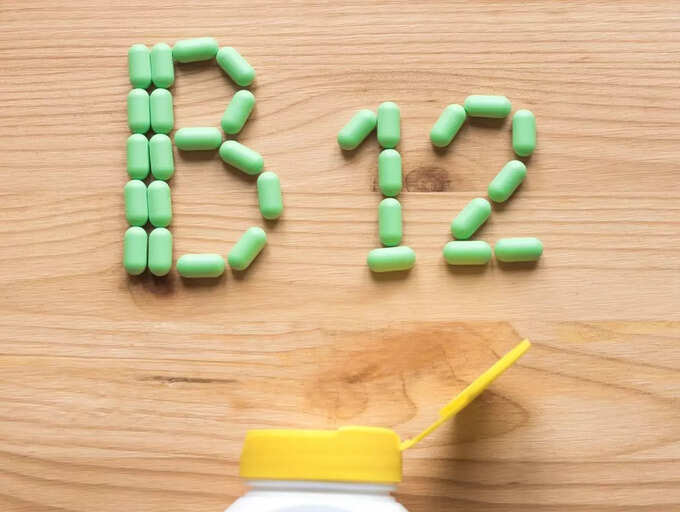
05-28-2022, 06:56 AM
|
|
Member
|
|
Join Date: Dec 2008
Location: India
Posts: 80,542
|
|
 TOP 10 Positives & Negatives of Vitamin B12 deficiency
TOP 10 Positives & Negatives of Vitamin B12 deficiency
Warning signs of Vitamin B12 deficiency
 Vitamin B12 is one of the most essential nutrients that your body requires. It is a water-soluble vitamin that is present in many foods and is also available in the form of supplements. However, B12 deficiency among people is more common than you think. Symptoms can range from extreme fatigue, mood problems, skin changes to more severe illnesses such as gastrointestinal issues, unusual memory loss, elevated heart rate and breathing difficulties.
Vitamin B12 is one of the most essential nutrients that your body requires. It is a water-soluble vitamin that is present in many foods and is also available in the form of supplements. However, B12 deficiency among people is more common than you think. Symptoms can range from extreme fatigue, mood problems, skin changes to more severe illnesses such as gastrointestinal issues, unusual memory loss, elevated heart rate and breathing difficulties.
Role of Vitamin B12

- Vitamin B12 plays several roles in your body. It not only helps enhance energy and boost metabolism, but it also works towards the development of brain and nerve cells, while also facilitating the production of DNA.
- Given that our bodies cannot produce Vitamin B12, the best way to get sufficient amounts of this vital nutrient is through natural sources like animal products consisting of seafood, eggs, poultry and some forms of dairy. That said, although certain veggies and legumes contain Vitamin B12, they do not provide as much nutrients as opposed to non-vegetarian foods.
Best sources of Vitamin B12

- Vitamin B12 is a nutrient that cannot be produced naturally in the body. Therefore, if you want to increase your intake of vitamin B12, choose the right foods.
Some of the best sources of Vitamin B12 can be your favourite foods, which include:
- Milk
- Eggs
- Yogurt
- Fatty fishes
- Red meat
- Clams
- Fortified cereal
Study indicates 'neurologic damage' caused by Vitamin B12 deficiency

- As discussed, Vitamin B12 is a necessary nutrient that helps keep the nervous system healthy, maintaining the overall health of the body too.
- According to the BMJ, severe Vitamin B12 deficiency can lead to "permanent neurologic damage".
The health body notes that "earlier manifestations are generally subtle or asymptomatic".
- However, "if neurological problems do develop, they may be irreversible," warns the health body.
Five signs to watch out for

- The National Health Services (NHS) lists down the neurological problems one may face if they lack Vitamin B12 in the body.
- Vision problems
- Memory loss
- Pins and needles or paraesthesia
- Loss of physical coordination (ataxia), which can affect your whole body and cause difficulty speaking or walking
- Damage to parts of the nervous system (peripheral neuropathy), particularly in the legs.
Other symptoms of Vitamin B12 deficiency

- Apart from 'neurologic damage', Vitamin B12 deficiency can lead to other variety of symptoms, which include:
- Fatigue
- Headaches
- Pale, yellow skin
- Gastrointestinal issues
- Inflammation of the mouth and tongue
- Pins-and-needles sensation in hands and feet
Who is at risk of Vitamin B12 deficiency?

- Everyone is prone to developing Vitamin B12 deficiency, given that they're not getting enough of the nutrients from their diet.
- However, studies suggest people who are 60 years old or older are more likely to have Vitamin B12 deficiency as compared to other age groups.
- "Older people and others who don’t produce enough stomach acid to absorb B12 properly, may also be at risk of deficiency," warns UK's Holland and Barrett.
Vitamin B12: Key points to know

- The reason why supplements and fortified foods that contain vitamin B12 should be eaten is because these contain it in its free form.
- Usually vitamin B12 binds to the food proteins. When it goes to the stomach, the hydrochloric acid and the enzymes unbind the vitamin from the protein and bring it to its free form. Here the vitamin binds to the intrinsic factor and is absorbed by the small intestine.
- The presence of vitamin B12 in free form in supplements makes it easier to be absorbed by the intestines.
Should you take supplements?

- Ideally, dietary supplements are for people who suffer from some kind of deficiency, which cannot be fulfilled by the food they eat. From age, stress to unhealthy eating habits, the reasons can be wide-ranging.
- That said, dietary supplements are not drugs rather food items that only compensate for the lack of nutrients in the body, but do not cure or prevent any illnesses.
- However, if you're planning to resort to supplements, it is best to talk to your physician and consult with them.
__________________
Future Story here
|










